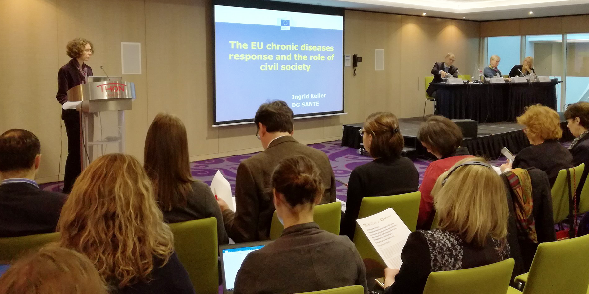Published on ncdalliance.org
Brussels, Belgium – On the 12th and 13th of December 2016, the NCD Alliance and the European Chronic Disease Alliance (ECDA) co-organised a European meeting on the role of civil society in the regional response to NCDs. The meeting, co-sponsored by the World Health Organisation, convened NCD Civil Society Organisations (CSOs) in the region and brought together 67 participants from 22 countries across Europe. It aimed to share experiences, strengthen networks and increase capacity to drive advocacy, policy and accountability as well as to support implementation of the 2016-2025 WHO European Action Plan for the Prevention and Control of NCDs and other regional NCD priorities.

Image: ncdalliance.org
The meeting provided an overview of NCD civil society in the European Region, highlighting strengths, challenges, opportunities and good practices. It shared information on the EU NCD response and the role of global NCD frameworks and discussed insights on trade and taxation in Europe. It provided examples of effective collaboration and opportunities for exchange between stakeholders and highlighted, for example, CSOs’ experiences in leveraging legal capacity for their work on NCDs. In advance of a full WHO European region civil society mapping report publication, the results of an online survey of CSOs were presented.
These indicated that CSOs across the WHO European region are an experienced cohort keenly interested in advocacy for improved policies. Results also highlighted the perceived value of enhanced civil society coordination in the region, with clear recognition of the potential of coalition building for exchange of best practice and of leveraging cross-cutting issues to involve a greater variety of organisations in NCD response efforts. Through smaller discussions, participants engaged in working groups tackling the issues of governance, prevention and health promotion, health systems, and surveillance, M&E, and research. By sharing national and regional experiences and perspectives, participants collectively conducted a SWOT analysis of civil society action on NCDs to arrive at a list of main contributions and needs.
The meeting resulted in a set of key recommendations towards NCD CSOs in the WHO European region, the WHO Regional Office for Europe, the NCD Alliance, and ECDA, to strengthen the action and contribution of NCD civil society in the WHO European region under the framework of the 2016-2025 WHO European Action Plan for the Prevention and Control of NCDs. The final mapping report of NCD CSOs in Europe along with a full meeting report will be available in early February 2017.




